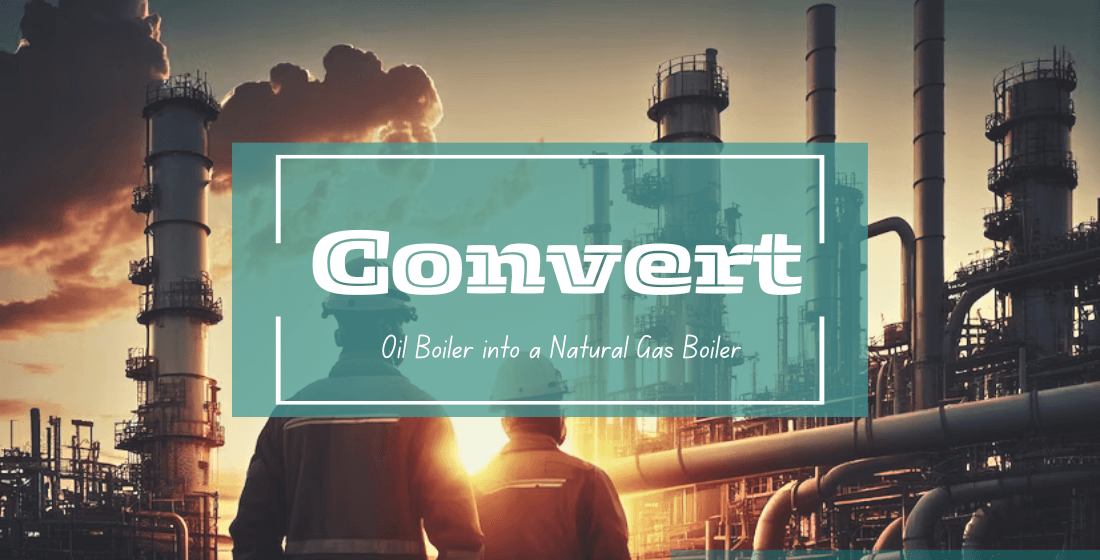Green Engineering Advice: How to Turn an Oil Boiler into a Natural Gas Boiler
Homeowners and companies looking to lower their energy bills, improve system efficiency, and lessen their environmental effects are increasingly choosing to switch from oil-fired boilers to natural gas-powered ones. This change makes use of natural gas’s cleaner combustion process than oil, in addition to being in line with green engineering principles. This is a thorough guide on converting an oil boiler to natural gas and creating a more environmentally friendly heating system.
Why Make the Switch to Natural Gas?
- 1. Environmental Benefits: Natural gas burns cleaner than oil, generating a lot less particulate matter and fewer greenhouse gas emissions. This decrease aids in the fight against climate change and improves air quality.
- 2. Cost Savings: In places with a lot of natural gas infrastructure, natural gas is frequently less expensive than heating oil. Additionally, it provides steady pricing without the abrupt swings that often occur in oil markets.
- 3. Efficiency Gains: Natural gas-fired boilers tend to be more energy-efficient than their oil-fired counterparts, which results in improved performance and reduced energy usage.
- 4. Convenience and Reliability: Natural gas is delivered straight through pipes, providing a steady supply, in contrast to oil, which needs to be delivered frequently and stored in tanks.
How to Turn an Oil Boiler into a Natural Gas Boiler
- 1. Determine viability: Determine whether the conversion is feasible for your property before proceeding. To evaluate the following, speak with a certified heating engineer or contractor:
- Natural gas availability in your region.
- The state of your current boiler and if conversion is supported.
- permits and the project’s regulatory obligations.
- 2. Assess Your Boiler: While some oil boilers may need to be replaced entirely, others may be able to be converted to natural gas burners. Make sure that the new burner is compatible with the design and specs of your boiler if retrofitting is feasible.
- 3. Verify Gas Line Infrastructure: Verify access to a natural gas pipeline by contacting your utility provider. You would have to spend money extending the pipeline to your property if there isn’t a gas line, which could have an impact on project budgets and schedules.
- 4. Obtain Required Permissions: Making changes to your heating system, such as converting your boiler, may call for local permissions. Verify that all documentation conforms with local safety regulations and construction laws.
- 5. Employ a Qualified Professional: The conversion or replacement will be performed by a qualified HVAC specialist or technician.
- The natural gas burner will be installed or modified.
- Attach the gas pipeline to the system.
- The system should be tested and calibrated to guarantee peak performance.
- 6. Optimize Your Heating System: To increase the overall efficiency of your system, think about installing insulation or switching to a programmable thermostat. These improvements go hand in hand with the natural gas boiler’s increased efficiency and cleanliness.
Challenges and Considerations
- 1. Initial Expenses: The initial conversion cost may be expensive, but long-term savings are a major benefit. Boiler replacement, burner retrofitting, and pipeline installation are among the costs.
- 2. Maintenance: Regular inspections are necessary to guarantee safety and performance, even though natural gas systems require less maintenance than oil boilers.
- 3. Environmental Trade-offs: Natural gas is still a fossil fuel, even though it is cleaner than oil. For some homes, switching to renewable energy systems—like heat pumps—might be a better long-term option.
Advantages Over and Above Energy Efficiency
In addition to financial and environmental benefits, switching to natural gas can increase the value of real estate. Buyers tend to find homes with energy-efficient, contemporary heating systems more appealing. Natural gas’s ease of use can also enhance the quality of life by eliminating the inconvenience of tank maintenance and oil delivery.
Conclusion
Making the switch from an oil boiler to a natural gas boiler is a sensible and sustainable step toward using less energy. It lowers energy expenses and greenhouse gas emissions while providing a cleaner, more effective heating solution. To guarantee a smooth and safe transition, it is crucial to balance the initial outlay of funds against the long-term advantages and seek advice from experts. You can increase the sustainability, comfort, and economy of your house or place of work by implementing green engineering concepts and seeking professional help. Adopting natural gas is in line with the global movement for ecologically conscious living and represents a significant step toward a cleaner energy future.
How to Convert Your Oil Boiler to Natural Gas with DEC
Switching your heating system from oil to natural gas requires careful planning and expert assistance. Follow these steps to ensure a smooth and eco-friendly transition with DEC:
- Consult with Our MEP Experts
Schedule a consultation with our DEC engineering team to evaluate your existing boiler system, property requirements, and natural gas availability.
- Feasibility Assessment
Our experts will conduct a thorough inspection to determine if your boiler is convertible or if a new installation is needed. We’ll also verify local gas line infrastructure and regulatory permits.
- Design and Planning
We create a customized MEP design plan that outlines the system upgrade, energy efficiency improvements, and safety measures.
- Permit Acquisition
DEC will handle all the necessary permit applications, ensuring compliance with local building codes and regulations.
- System Conversion and Installation
Our certified HVAC specialists will retrofit your boiler or install a new natural gas burner, connecting it to the gas pipeline with precision and safety standards.
- Testing and Calibration
After installation, we conduct rigorous testing to optimize performance, efficiency, and safety before final commissioning.
- Post-Installation Support
We offer ongoing maintenance services to keep your new natural gas system running at peak performance.
Frequently Asked Questions (FAQs)
Converting to a natural gas boiler offers several benefits, including lower energy costs, increased energy efficiency, reduced carbon emissions, and a consistent fuel supply without the need for regular fuel deliveries.
The timeline for conversion typically ranges from a few days to a couple of weeks, depending on the complexity of the project, availability of natural gas lines, and necessary permits.
Some boilers can be retrofitted with natural gas burners, but older or incompatible models may require complete replacement. A professional assessment will determine if your current boiler can be converted.
The cost varies depending on factors such as boiler compatibility, pipeline availability, permits, and labor. While the initial investment can be high, long-term savings on fuel and maintenance often offset the cost.
Yes, most municipalities require permits for any modifications to heating systems. A licensed professional can help obtain the necessary approvals and ensure compliance with local regulations.
To optimize efficiency, consider installing smart thermostats, upgrading insulation, and scheduling regular maintenance. These upgrades complement the high efficiency of natural gas systems.
While natural gas is cleaner than oil, it is still a fossil fuel. For greater sustainability, homeowners can explore hybrid systems or renewable energy options like solar or heat pumps.





No comment